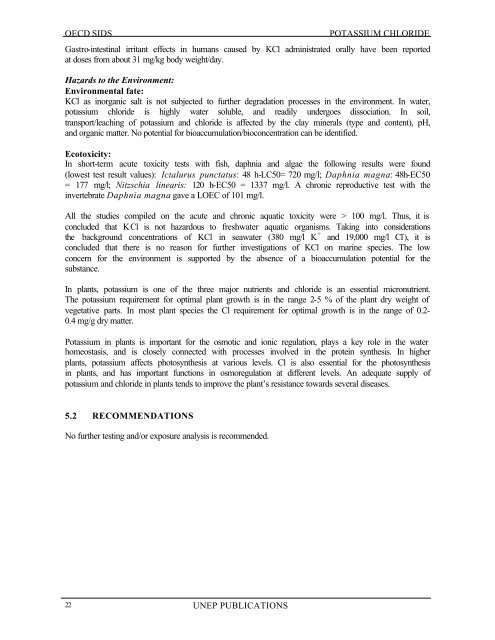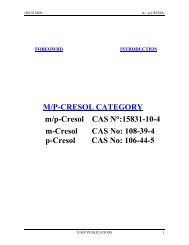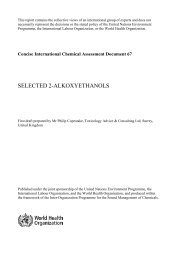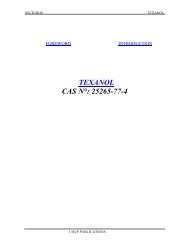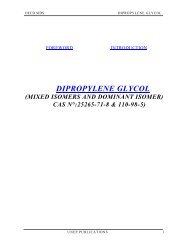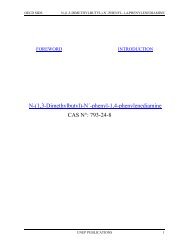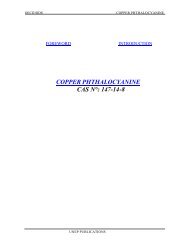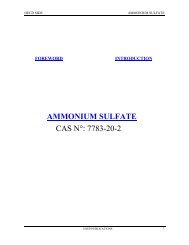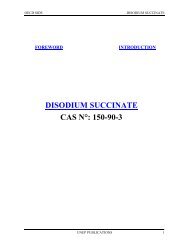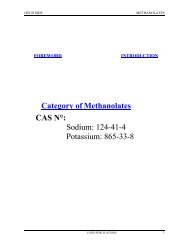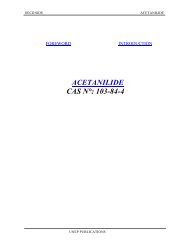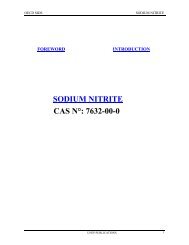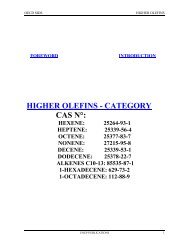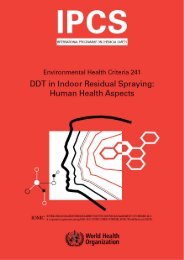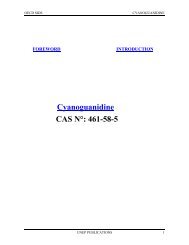POTASSIUM CHLORIDE CAS N°: 7447-40-7
POTASSIUM CHLORIDE CAS N°: 7447-40-7
POTASSIUM CHLORIDE CAS N°: 7447-40-7
You also want an ePaper? Increase the reach of your titles
YUMPU automatically turns print PDFs into web optimized ePapers that Google loves.
OECD SIDS <strong>POTASSIUM</strong> <strong>CHLORIDE</strong><br />
Gastro-intestinal irritant effects in humans caused by KCl administrated orally have been reported<br />
at doses from about 31 mg/kg body weight/day.<br />
Hazards to the Environment:<br />
Environmental fate:<br />
KCl as inorganic salt is not subjected to further degradation processes in the environment. In water,<br />
potassium chloride is highly water soluble, and readily undergoes dissociation. In soil,<br />
transport/leaching of potassium and chloride is affected by the clay minerals (type and content), pH,<br />
and organic matter. No potential for bioaccumulation/bioconcentration can be identified.<br />
Ecotoxicity:<br />
In short-term acute toxicity tests with fish, daphnia and algae the following results were found<br />
(lowest test result values): Ictalurus punctatus: 48 h-LC50= 720 mg/l; Daphnia magna: 48h-EC50<br />
= 177 mg/l; Nitzschia linearis: 120 h-EC50 = 1337 mg/l. A chronic reproductive test with the<br />
invertebrate Daphnia magna gave a LOEC of 101 mg/l.<br />
All the studies compiled on the acute and chronic aquatic toxicity were > 100 mg/l. Thus, it is<br />
concluded that KCl is not hazardous to freshwater aquatic organisms. Taking into considerations<br />
the background concentrations of KCl in seawater (380 mg/l K + and 19,000 mg/l Cl - ), it is<br />
concluded that there is no reason for further investigations of KCl on marine species. The low<br />
concern for the environment is supported by the absence of a bioaccumulation potential for the<br />
substance.<br />
In plants, potassium is one of the three major nutrients and chloride is an essential micronutrient.<br />
The potassium requirement for optimal plant growth is in the range 2-5 % of the plant dry weight of<br />
vegetative parts. In most plant species the Cl requirement for optimal growth is in the range of 0.2-<br />
0.4 mg/g dry matter.<br />
Potassium in plants is important for the osmotic and ionic regulation, plays a key role in the water<br />
homeostasis, and is closely connected with processes involved in the protein synthesis. In higher<br />
plants, potassium affects photosynthesis at various levels. Cl is also essential for the photosynthesis<br />
in plants, and has important functions in osmoregulation at different levels. An adequate supply of<br />
potassium and chloride in plants tends to improve the plant’s resistance towards several diseases.<br />
5.2 RECOMMENDATIONS<br />
No further testing and/or exposure analysis is recommended.<br />
22<br />
UNEP PUBLICATIONS


